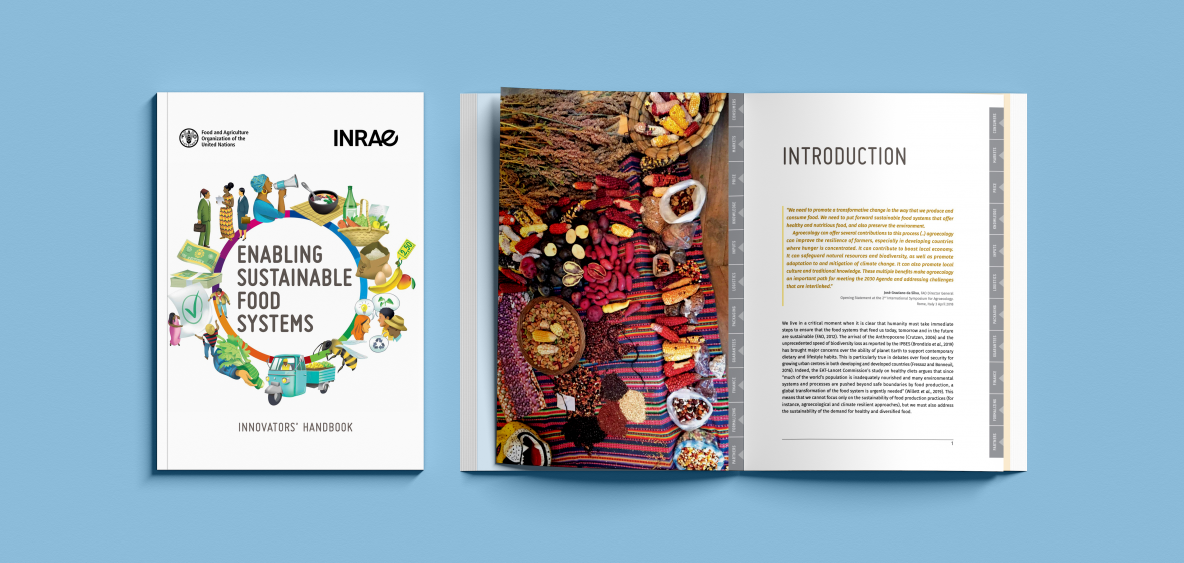
With support from RFS, FAO and INRAE have developed a handbook highlighting best practices and success stories from innovators around the world who are leading initiatives to grow, share, sell and consume more sustainable foods in their local communities.
Global food value chains are complex networks, involving the speedy transportation of food products across regions and continents. An avocado farmed in Kenya may be processed in South Africa and consumed in the United Kingdom. For many consumers, their food’s travel log is viewed as an afterthought or a reasonable price to pay for uninterrupted access to a wide variety of food in and out of season.
Even before the onset of COVID-19, these global food value chains began to face increasing amounts of scrutiny. Were these vast networks contributing or detracting from the attainment of our collective global economic, social and environmental goals? Do global food value chains offer a sustainable, resilient and equitable model for producing and distributing food?
In many ways, the global COVID-19 pandemic intensified this scrutiny and pushed these questions to the fore. Since March 2020, COVID-19 lockdowns and border control measures have had a cascading effect on the flow of food and food products across borders. In Kenya, the RFS country project team reported rotting harvests as farmers could no longer transport their food to market. Across Africa, the closures of borders have resulted in a logistical nightmare as truck drivers transporting food and other goods wait in daylong queues to cross borders. In Eswatini, the country project team reported that processing plant workers were laid off as plants downscaled or shut down completely.
As a result, consumers, producers and researchers have reported an increased reliance on local and sustainable food systems globally. Box-delivery schemes, farmers’ markets, cooperative and solidarity groceries and other forms of short food supply chains have reported increased demand in 2020. These types of local, resilient markets are the result of years of work by innovators who have introduced new ideas and sustainable practices into their food systems.
To capture the experiences and best practices of these innovators, a collaborative team from the Food and Agriculture Organization of the United Nations (FAO) and the French National Research Institute for Agriculture, Food and Environment (INRAE), with support from RFS, developed Enabling sustainable food systems: Innovators’ handbook, an interactive handbook that draws from a wealth of experiences from over 20 countries, including Ethiopia, Kenya, Nigeria, Senegal, Tanzania, and Uganda.
The handbook, available in English and French, is built upon the understanding that a food system transformation will require collaborative and systemic thinking around sustainable, resilient and integrated approaches for producing the food we eat. It provides concrete ideas, evidence and advice to support better policy and practice to build local food systems that protect our natural resource base and support local economies.
The development of the handbook began with exploring why and how local actors build local and sustainable food systems. This evolved into a participatory research project formed by a group of three women that documented innovative initiatives and advanced collective knowledge. New collaborators joined every year and the process expanded to include a wide range of geographic, gendered and organisational experiences. The result is the present handbook, which is the third in a series of FAO and INRAE publications related to institutional innovations in domestic and local markets for sustainable agriculture (download the previous publications in the series here and here).
The document is written for “sustainable food systems innovators” by a group of innovators from Asia, Africa, the Americas and Europe who are leading initiatives to grow, share, sell and consume more sustainable foods in their local contexts (e.g., Urgenci, IFOAM, Familia de la Tierra, Rede Ecovida, FreshVeggies, Jaivik Haat, Earth Net Foundation, PELUM Kenya).
The handbook was officially launched 3 December 2020 during a side event of the 3rd Global Conference of the One Planet Network Sustainable Food Systems Programme.
The side event featured an interactive session, which took participants on a journey with the main authors of the handbook to learn more about their approaches for building sustainable local food systems. Participants took part in a role play exercise, inspired by real life experiences, to explore the challenges the authors faced and the innovations they developed to resolve them.
By structuring both the handbook and the side event as a “choose your own adventure” story, each participant was able to develop their own personalised learning experience across four categories of innovations: engaging consumers, producing sustainably, getting products to market and getting organised. The side event was widely successful, reaching more than 600 people, ranging from food system actors and farmers to policymakers.
With this handbook, FAO, INRAE and RFS aim to encourage potential innovators around the world to test new ideas and adapt successful approaches for improving the productivity and sustainably of food systems in their community. At the event, Remi Nono Womdim, Deputy Director of the Plant Production and Protection Division of FAO, expressed his hope that “the advice and tips provided in this handbook inspire a positive attitude regarding the innovative capacity of local actors around the world.”
Subscribe to our monthly newsletter to receive updates on stories directly from the field across all our projects, upcoming events, new resources, and more.